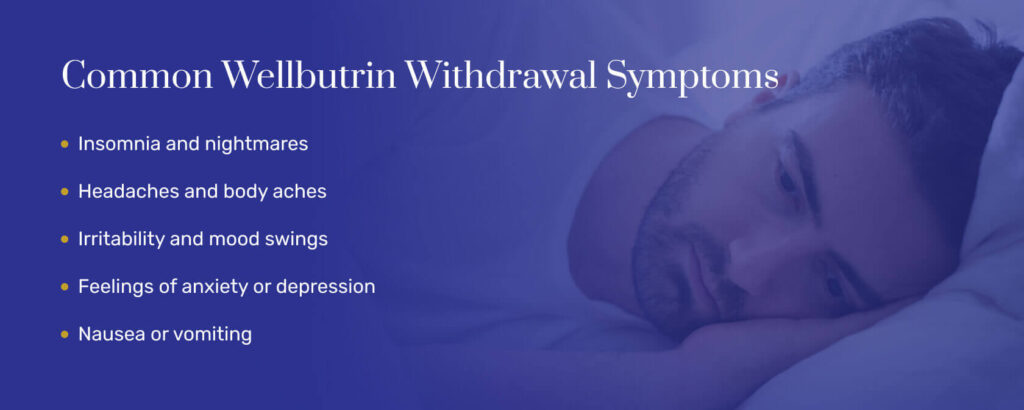Are you or someone you know struggling with addiction?
I may have a problem I am concerned for a loved oneFor so many, Wellbutrin (or the generic version, bupropion) starts out as a sigh of relief or a glimmer of hope. As an antidepressant that’s prescribed for major depressive disorder and for seasonal affective disorder, it can help you finally feel like yourself again after a long struggle with depression. It’s also a smoking cessation aid, so you might use it to finally kick cigarettes or nicotine to the curb and free yourself from the costs and complications of smoking. But Wellbutrin can cause a dependence of its own, and when you choose to stop taking it, you may experience withdrawals.
When you take your Wellbutrin as prescribed, you will develop a dependence on the medication. This isn’t concerning and doesn’t mean you are addicted—it’s simply the body’s natural adaptation to the presence of Wellbutrin. When you abruptly stop taking it, you may experience Wellbutrin withdrawal symptoms, also known as antidepressant discontinuation syndrome. These may include mood swings, insomnia, nightmares, and body aches.
The good news is that these symptoms are less common with Wellbutrin than with other types of antidepressants like Zoloft and Lexapro which are selective serotonin reuptake inhibitors (SSRIs). Still, if you’re thinking of quitting Wellbutrin, talk to your doctor. They can create a gradual tapering schedule in which you slowly wean off the medication, which can reduce symptoms and help your body adjust to lower doses.
What is Wellbutrin Withdrawal?
Quick Answer
Wellbutrin withdrawal occurs when you suddenly stop taking your medication. You may experience withdrawal symptoms like brain zaps, insomnia, suicidal ideation, vomiting, dizziness, and tremors. The best way to prevent Wellbutrin withdrawal symptoms is to talk to your doctor about creating a tapering schedule.
Wellbutrin Withdrawal Symptoms: Antidepressant Discontinuation Syndrome
Many people may experience no issues at all when they stop taking Wellbutrin, while others may experience mild to moderate bupropion withdrawal symptoms. If you do have symptoms, this is called antidepressant discontinuation syndrome. This could include [2]:
- Insomnia – You might have difficulty getting to sleep, or you might fall asleep without issue but wake up often throughout the night.
- Nightmares – You could have unpleasant or unusual dreams while withdrawing from Wellbutrin.
- Headache – When you stop your medication, you could have a painful headache that persists or comes and goes.
- Body aches – Similar to the way you feel when you have the flu, you might have widespread body aches during your withdrawal.
- Anxiety – You might feel anxious when you stop taking your bupropion, worrying more about things excessively or feeling paranoid.
- Irritability – It’s common to feel irritable or quick to anger while you’re withdrawing from Wellbutrin.
- Mood swings – Along with feeling irritable, you might find that your mood changes a lot and changes dramatically at times.
- Depression – Unsurprisingly, you could feel depressed while your body adjusts to being without an antidepressant. But this should be temporary – the way you feel during withdrawal isn’t the way you’ll always feel without your Wellbutrin.
- Suicidal ideation – In some cases, you may find yourself with suicidal thoughts during your withdrawal. It’s important to recognize that these are temporary and to have a plan for support to keep you safe.
- Nausea, vomiting, or diarrhea – You might have digestive symptoms and feel sick to your stomach or have diarrhea.
- Stomach cramps – While withdrawing from your Wellbutrin, you could have uncomfortable stomach cramps whether or not they’re accompanied by diarrhea.
- Loss of appetite – Even if you don’t feel nauseated, you might find yourself without an appetite as your body adjusts.
- Dizziness – At times during your withdrawal, you might feel dizzy or lightheaded, or you could feel unsteady on your feet.
- Tremors – Some people withdrawing from Wellbutrin have tremors, similar to the way you shiver in the cold.
- Brain zaps – Brain zaps are a unique symptom of antidepressant withdrawal, which feel like a brief electric shock in your head.
- Numbness in the face or limbs – At times in your withdrawal you might be unable to feel your limbs or your face.
Unlike popular antidepressants that act on serotonin, such as Prozac, Zoloft, and Lexapro, Wellbutrin affects norepinephrine and dopamine. As such, Wellbutrin withdrawal symptoms tend to be far milder than these other antidepressants, and often, symptoms may not appear at all.[3]

Wellbutrin Withdrawal Timeline
How long will you have symptoms from Wellbutrin withdrawal, if you have them at all? The timeline largely depends on the half-life of this antidepressant medication.
The half-life refers to how long it takes for the medication to be reduced by 50% in the body. Generally, the half-life is three or four hours if someone takes it just a few times; however, when taking it every day as prescribed by a doctor, the half-life is about 21 hours [1]. So every 21 hours, the amount in your body will drop by 50%.
Because of this, Wellbutrin withdrawal symptoms may appear about two days after your last dose of bupropion. The symptoms of quitting bupropion may last for a few days to a couple of weeks, depending on many factors, including:
- Wellbutrin dose – The more Wellbutrin you’ve been taking, the more of it your body is used to having in your system. So when you stop taking a high dose, it takes longer for the Wellbutrin to get out of your system.
- Duration of use – There’s a reason that when you start taking a medication (like Wellbutrin), it can take some time before you get the full effects – because the medication builds up in your body over time until it reaches the full therapeutic level. If you’ve been taking Wellbutrin for a while and you’ve been maintaining it at the full therapeutic level for some time, it can take longer for the Wellbutrin to fully get out of your system.
- Individual physiology – In the same way that a virus might affect one person differently than another or a diet can have different effects for one person than another, everyone’s body reacts to Wellbutrin withdrawal in different ways. Based on how your body metabolizes the medication and how it adjusts to the withdrawal, your symptoms could last longer or be more brief.
- Physical and mental health – How your body reacts to Wellbutrin withdrawal (and how long that withdrawal takes) can depend on your health, like any chronic health conditions you have or your mental health conditions.
- Whether you tapered your dose or not – In many cases, if you taper off your Wellbutrin, you may not have any withdrawal symptoms at all. But if you do have symptoms, they’re more likely to be milder and short-lived because your body doesn’t have such a sharp drop-off of the medication.
When to Seek Professional Help for Wellbutrin Withdrawal
Generally, bupropion withdrawal is expected to be fairly mild and can be managed at home or on an outpatient basis with a doctor. However, some people may experience concerning mental health symptoms when they discontinue Wellbutrin. You should call 911 or your doctor immediately if you experience:
- Thoughts of hurting yourself or others
- Thoughts about how you would hurt or kill yourself
- Severe depression
- Extreme anxiety or panic attacks that interfere with functioning
- Agitation or manic behavior
- Extreme impulsivity or reckless behavior
How to Prevent Bupropion Withdrawal Symptoms
The best way to prevent bupropion withdrawal symptoms is to work with your doctor to gradually taper off the Wellbutrin. They will create a tapering plan that’s individualized for you based on factors like your dosage, your health, and how long you’ve been taking the medication. During the tapering process they will adjust the regimen if you experience unwanted side effects or symptoms.
This tapering schedule may last for a few weeks until you eventually reach 0mg. If you are struggling with depression or anxiety, it’s best to seek out mental health treatment, such as therapy and counseling sessions. It’s important to commit to attending therapy on an ongoing basis so you can work through various issues, address mental health symptoms, and work through problems together.
Your doctor may also recommend you switch to a different antidepressant if the reason for your tapering was because of Wellbutrin side effects.
How to Cope with Wellbutrin Discontinuation Syndrome
If you are experiencing Wellbutrin withdrawal symptoms after stopping this antidepressant, make sure you alert your therapist or doctor so they can support you during this uncomfortable time. You may need extra therapy sessions to help you manage for a while.
Some things you can do to ease your symptoms at home may include:
Meditate and practice mindfulness, which can help manage anxiety and cause relaxation.
Spend time with loved ones, which can help reduce depressive symptoms. [4]
Engage in joyful movement, such as dancing, yoga, an exercise class, taking the dog for a walk, hiking, or playing a sport.
Eat balanced, nutritious meals and get enough sleep.
Take relaxing baths or get a massage.
Use a nicotine patch or gum if you were using Wellbutrin to quit smoking.
Take over-the-counter herbal supplements such as St. John’s Wort. Remember to talk to your doctor first, though, as some herbal supplements can interact poorly with certain medications or health conditions.
Detox Options for Wellbutrin Withdrawal and Addiction
Although Wellbutrin is most commonly used to treat depressive disorders, some people may misuse it in order to get high. This is most common in people who are incarcerated [4]. They may abuse bupropion by crushing the pills and snorting the powder, although some people also inject this antidepressant too [5].
People refer to Wellbutrin as “poor man’s cocaine” due to its stimulant-like effects and high.[6] And chronic Wellbutrin abuse can lead to more severe physiological dependence and subsequent withdrawal.
If you misuse Wellbutrin and are struggling with an addiction to it, then professional detox is likely needed to help you quit—followed by a comprehensive drug rehab program where you can learn coping skills to help you avoid relapse in the future.
Detox settings for Wellbutrin withdrawal may include:
Occurring in a hospital, acute care setting, or freestanding detox center, this is the most intensive detox option, offering 24/7 medical care and support to keep you safe during withdrawal.
Non-medically managed residential detox
You live at the detox facility during Wellbutrin withdrawal but there is limited access to medical care. This is also called social detox.
Partial hospitalization or intensive outpatient
You live at home and attend detox treatment sessions at a clinic for up to 30 hours per week, depending on the specific program.
Standard outpatient detox
You reside at home and attend detox sessions for a few hours each week. This is not typically recommended for a severe addiction or someone who has a co-occurring medical or psychological condition.
Once you complete bupropion detox, it’s best to transition into a residential rehab or outpatient treatment program where you can address the underlying reasons you misused Wellbutrin in the first place.


Mixing Antidepressants with Alcohol
After you stop taking Wellbutrin, if you have withdrawal symptoms at all, they could last anywhere from a few days to a few weeks. It’s rare to have symptoms for more than three or four weeks.
No, it’s not advised to stop taking Wellbutrin cold turkey (stopping abruptly from your full dosage rather than tapering down your dosage gradually). There’s no way to know how your body will react, so even if you know someone who has done this and didn’t have complications, it’s not safe to take the gamble.
Your ideal tapering regimen will depend on factors like your health and mental health, your dosage, how long you’ve been taking bupropion, and more. For this reason, you should work with the doctor who’s prescribing your medication and they can make a plan for you to taper your dosage safely.
- Bupropion. (May 2022). StatPearls.
- Going off antidepressants. Harvard Health Publishing Harvard Medical School. May 2022. Accessed March 2025.
- The effect of social interaction quantity and quality on depressed mood and loneliness: A daily diary study. Kuczynski AM, Halvorson MA, Slater LR, Kanter JW. (2022). Journal of Social and Personal Relationships, 39(3):734-756.
- Wellbutrin®: misuse and abuse by incarcerated individuals. Phillips D. (2012). Journal of addictions nursing, 23(1), 65–69.
- A Systematic Review of Abuse or Overprescription of Bupropion in American Prisons and a Synthesis of Case Reports on Bupropion Abuse in American Prison and Non-prison Systems. Aikoye S, Basiru T O, Nwoye I, et al. (March 15, 2023). Cureus 15(3): e36189. doi:10.7759/cureus.36189
- Relationship Between Family and Friend Support and Psychological Distress in Adolescents. Margaret M. Fitzpatrick BSN, Avery M. Anderson PhD, Christopher Browning PhD, Jodi L. Ford PhD. (2024). Journal of Pediatric Health Care, 38(6): 804-811.











